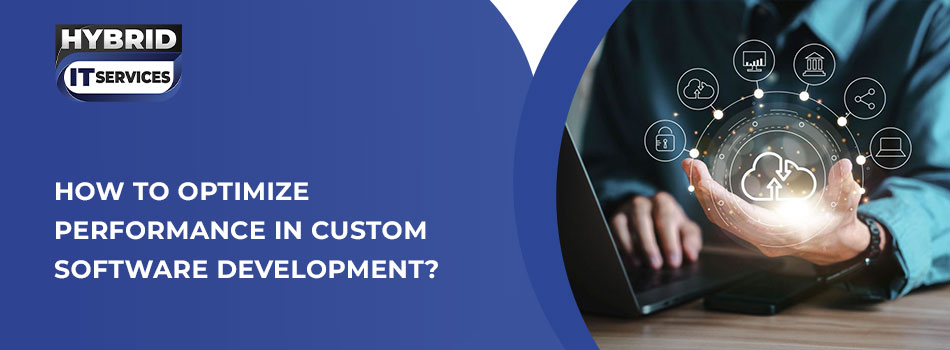Custom software development optimization is crucial to ensuring efficiency, scalability, and reliability. Enhance customer experiences and gain a competitive edge.
However, if the software is not optimized for performance, it can lead to slow response times, system crashes, and poor user satisfaction.
At Hybrid IT Services, let's explore key strategies to enhance software performance, making it faster, more responsive, and adaptable to business needs.
Optimize Performance in Custom Software Development
Here are some best practices for custom software optimization. Let’s see how to do performance tuning in custom development.
Understand Business Requirements Clearly
The foundation of high-performing software starts with a thorough understanding of business needs. Before development begins, it is essential to define the core functionalities and expected user load.
Identify potential scalability needs and understand integration requirements with other tools and systems. You need to conduct market research to benchmark against industry standards. By clarifying requirements early, developers can design an optimized architecture.
For a deeper understanding of how to align your software development with business goals, check out How to Choose a Custom Software Development Partner.
Choose the Right Technology Stack
Selecting the right combination of programming languages, frameworks, and databases is important. This selection significantly impacts software performance.
The right tech stack minimizes bottlenecks and enhances the speed of software applications. Consider these software performance enhancement techniques:
- Backend Technologies: Use high-performance languages like Golang, Python, or Node.js for faster execution.
- Frontend Frameworks: React.js, Angular, or Vue.js ensure smooth user interactions.
- Databases: Choose relational (MySQL, PostgreSQL) or NoSQL (MongoDB, Cassandra) databases based on data structure and query complexity.
- Cloud Services: AWS, Azure, or Google Cloud provide scalable solutions with optimized performance.
Optimize Code Efficiency
Writing clean, structured, and optimized code is crucial to software performance. Following coding best practices ensures that the software runs smoothly. Here are key coding best practices to improve software performance:
- Reduce redundant code by using functions, modules, and reusable components.
- Optimize loops and conditions to minimize processing time.
- Use asynchronous processing to prevent delays in operations.
- Minimize API calls and use caching mechanisms to store frequently accessed data.
Enhance Database Performance
A poorly optimized database can significantly slow down software applications. To enhance database efficiency, use indexing to speed up search queries.
You need to normalize data to eliminate redundant storage. Implement caching (Redis, Memcached) to store frequently used queries.
Further, optimize queries by selecting only necessary fields instead of retrieving entire tables. Use database sharding for handling large-scale applications. A well-structured database speeds up response times and improves software performance.
Leverage Cloud Computing and Load Balancing
Custom software solutions in Phoenix often serve businesses with growing demands. Cloud optimization ensures seamless performance, even during traffic spikes. Using cloud computing and load balancing ensures:
- Elastic scalability: Automatically scales resources based on traffic.
- Load balancing: Distributes user requests across multiple servers to prevent overloading.
- CDN (Content Delivery Network): Speeds up content delivery by serving users from geographically closer servers.
Implement Caching Mechanisms
Caching reduces load times by storing frequently accessed data. There are several caching techniques:
- Browser caching: Stores static assets like images and scripts locally.
- Server-side caching: Uses in-memory storage to retrieve responses faster.
- Database caching: Prevents repeated database queries by storing commonly accessed data. Using caching effectively reduces database and server loads, enhancing software speed.
Conduct Regular Performance Testing
Testing is an integral part of performance optimization. Regular testing helps detect bottlenecks early and ensures a smooth user experience. Developers should perform:
- Load testing: Checks how software handles simultaneous users.
- Stress testing: Examines system stability under extreme conditions.
- Performance benchmarking: Compares performance metrics with industry standards.
- Code profiling: Identifies slow functions that need optimization.
Improve Frontend Optimization
Frontend performance impacts user engagement. To improve software performance and optimize frontend efficiency:
- Minify CSS, JavaScript, and HTML to reduce file size.
- Optimize images using compression techniques.
- Use lazy loading to load images and scripts only when needed.
- Enable Gzip compression for faster content delivery. A well-optimized front end enhances the speed and responsiveness of web applications.
Ensure Security Without Compromising Performance
Security is vital, but it should not slow down software. To balance security and performance:
- Use lightweight encryption techniques for sensitive data.
- Implement secure authentication protocols (OAuth, JWT).
- Use web application firewalls (WAFs) to prevent cyberattacks.
- Optimize SSL/TLS encryption for fast and secure data transmission. Securing software while maintaining speed ensures a reliable user experience.
Optimize Third-Party Integrations
Many custom software solutions integrate with third-party APIs and services. Well-optimized third-party integrations prevent slowdowns and enhance overall system efficiency. To ensure optimal performance:
- Use efficient API request handling (batch processing, rate limiting).
- Cache API responses to reduce repetitive external requests.
- Monitor API performance to identify slow responses.
Implement DevOps and CI/CD Practices
Continuous Integration and Continuous Deployment (CI/CD) help maintain software performance by
- Automating code testing and deployment to detect errors early.
- Enabling frequent updates without downtime.
- Using containerization (Docker, Kubernetes) for efficient resource utilization. Also, monitoring real-time system performance to detect performance issues. CI/CD streamlines development and ensures consistently optimized software performance.
Learn more about DevOps benefits in What Are the Benefits of DevOps Consulting Services?
Monitor and Analyze Performance Metrics
Continuous monitoring helps identify areas for improvement. Developers should track:
- Response times: Measures how quickly software reacts to requests.
- Server load: Checks CPU and memory usage.
- Error rates: Identifies frequent system failures.
- Database query performance: Ensures efficient data retrieval.
Choose Custom Software Development Phoenix
At Custom Software Development Phoenix, we understand that every business is unique. Off-the-shelf software might not always fit specific business needs.
Our Phoenix-based team has experienced developers and IT experts. We work closely with you from the start to ensure that every solution we provide fits your business goals perfectly.
Our developers have strong industry knowledge, which helps us anticipate challenges and follow regulations. We create solutions that match your business goals. Whether you work in finance, healthcare, retail, or education, we’ve got you covered. Our features include:
- Regulatory Compliance
- Innovation and Adaptation
- Business Integration (IoT)
- Machine Learning Models
- Process Automation
Conclusion
Optimizing performance in custom software development in Phoenix requires a smart approach. This includes efficient coding, database tuning, cloud computing, caching, security, and continuous monitoring.
Consult now for a seamless user experience and long-term success in the competitive Phoenix market.






